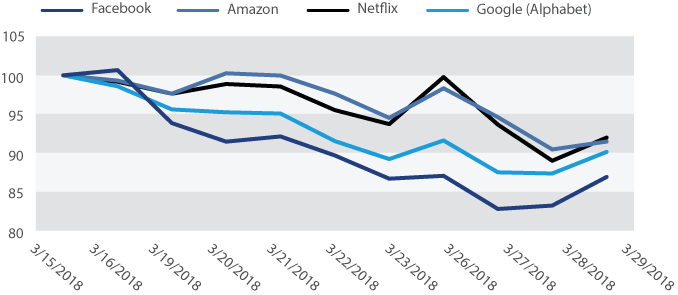
Summary
The tech stocks that fuelled the last bull market have seen their share prices plummet as an onslaught of bad headlines takes its toll. More regulation and taxation are almost certainly on the horizon amid growing concerns about privacy, governance and profitability.
Key takeaways
|
FANGs face more bad news
Just as the technology, media and telecom convergence inflated the dot-com bubble in the late 1990s, the likes of Facebook, Amazon, Netflix and Google – the FANGs – accelerated the most recent run-up in US equities. But lately, not all has been fine for the FANGs. Their stocks have led the stockmarket’s recent sell-off, losing 11 per cent on average during the last 11 trading days in March, according to Bloomberg.
FANGs slid sharply after ides of March
Price movements 15-29 March 2018, indexed to 100

Source: Bloomberg. Data as at 29 March 2018 (markets were closed on 30 March).
Hand-in-hand with their declining valuations, their public perceptions are also taking a hit:
- Facebook is being criticized for how it uses private data, as evidenced by the growing scrutiny on Cambridge Analytica.
- Amazon’s success has been tied to a hollowed-out US jobs market, and President Donald Trump has singled out the firm with strongly worded tweets.
- Google’s near-monopoly status has drawn the ire of many politicians and pundits; together with Facebook and others, the firm is also grappling with accusations of abetting election interference and terrorism.
Although the FANGs have different business models, they face similar questions about their social impact and value – and they’re feeling pressure from governments, regulators and users. We outlined many of the pitfalls the FANGs face, including increased regulation and greater taxation, in a 2017 article entitled “De-FANGed: 5 Ways the Disruptors Could Be Disrupted”. Unfortunately, more bad news may be in store for the FANGs and their peers.
Four more forces fighting the FANGs
Pride comes before the fall
FANG-type firms have re-energized the consumer experience across the developed world, but at what cost? The rise of e-commerce is hollowing out shopping malls and main streets, displacing many employees who once worked there. To be sure, the business models of the FANG family may be too popular not to endure, but they have begun to see their share of trust damaged. All companies form part of the social and ethical structures of their societies, and the pursuit of profit is only one goal.
Ironically, while the FANGs are increasingly seen as a hindrance to democracy and fair competition, their Chinese equivalents – Baidu, Alibaba and Tencent, also known as the BATs – seem to be more willing, more able or more compelled to align themselves with their own government. The BATs are also viewed less as troublemakers than as modernizers of the emerging markets, feeding the needs of consumers who want to shop, communicate and be entertained on their smartphones.
Setting aside the FANGs’ public perception problems, two particular numbers underscore the investment case for BATs: the BATs will ultimately be able to access over 4 billion consumers across Asia, while the home market for the FANGs is less than 750 million. In the FANGs versus the BATs, one battle may be raging, but the war may have already been won.
Some or all the securities identified and described may represent securities purchased in client accounts. The reader should not assume that an investment in the securities identified was or will be profitable. The securities or companies identified do not represent all of the securities purchased, sold, or recommended for advisory clients. Actual holdings will vary for each client. FANG is an acronym widely used on Wall Street and among many investors; it stands for four high-performing large-cap technology companies – Facebook, Amazon, Netflix and Google (now Alphabet) – that are also household names. BAT is a similarly widely used acronym for three large-cap tech companies in China: Baidu, Alibaba and Tencent.
Investing involves risk. The value of an investment and the income from it will fluctuate and investors may not get back the principal invested. Past performance is not indicative of future performance. This is a marketing communication. It is for informational purposes only. This document does not constitute investment advice or a recommendation to buy, sell or hold any security and shall not be deemed an offer to sell or a solicitation of an offer to buy any security. The views and opinions expressed herein, which are subject to change without notice, are those of the issuer or its affiliated companies at the time of publication. Certain data used are derived from various sources believed to be reliable, but the accuracy or completeness of the date is not guaranteed an no liability is assumed for any direct or consequential losses arising from their use. The duplication, publication, extraction or transmission of the contents, irrespective of the form, is not permitted. This material has not been reviewed by any regulatory authorities. In mainland China, it is used only as supporting material to the offshore investment products offered by commercial banks under the Qualified Domestic Institutional Investors scheme pursuant to applicable rules and regulations. This document is being distributed by the following Allianz Global Investors companies: Allianz Global Investors U.S. LLC, an investment adviser registered with the U.S. Securities and Exchange Commission; Allianz Global Investors GmbH, an investment company in Germany, authorized by the German Bundesanstalt für Finanzdienstleistungsaufsicht (BaFin); Allianz Global Investors Asia Pacific Ltd., licensed by the Hong Kong Securities and Futures Commission; Allianz Global Investors Singapore Ltd., regulated by the Monetary Authority of Singapore [Company Registration No. 199907169Z; Allianz Global Investors Japan Co., Ltd., registered in Japan as a Financial Instruments Business Operator [Registered No. The Director of Kanto Local Finance Bureau (Financial Instruments Business Operator), No. 424, Member of Japan Investment Advisers Association and Investment Trust Association, Japan]; and Allianz Global Investors Taiwan Ltd., licensed by Financial Supervisory Commission in Taiwan.
464757
About the author

Should you “sell in May and go away”?

Summary
Market indicators point to a more supportive environment for investors who once may have been swayed by the seasonal “sell-in-May” strategy. Here are five ways to potentially benefit from today’s climate of strong fundamentals, healthy earnings growth and accommodative monetary policy.
|
Key takeaways
|







Greater consumer-privacy protections
In recent years, billions of consumers have come to enjoy – and even rely on – the “free” digital services that companies like Facebook and Google provide. Yet recent scandals over privacy are causing a growing number of people to realize what Apple CEO Tim Cook once said best: “when an online service is free, you’re not the customer ... you’re the product”.
To be fair, not all users want to opt out of the ads and services that FANG-type firms sell; in fact, some simply don’t care how their digital information is used. Others may be concerned, but ultimately unable or unwilling to pay for a service like Facebook’s should it change its advertising-supported business model.
As the fight continues over the monetization of private information, the European Union will soon step into the ring with its new General Data Protection Regulation – a robust set of requirements aimed at guarding the personal information of all EU citizens. Launching in May 2018, GDPR will raise the costs of mining and disseminating digital data, which could affect the bottom line of any firm doing business in the EU. That includes the FANGs.
With privacy concerns increasingly making headlines, we expect more jurisdictions to put an emphasis on personal privacy instead of taking a laissez-faire approach. If this movement spreads to society at large, perhaps the social propriety of social media could be called into question. Even if the #deletefacebook movement ultimately loses steam, the customer is always right – and votes with his or her feet.
Calls for better corporate governance
Before recent revelations about alleged election interference, much of the wariness about social media was limited to non-millennial generations. But today, consumer angst seems tangible and rising, and attention is turning to the corporate-governance structures – or lack thereof – that permitted what many consider to be the systematic abuse of society’s data and trust.
Arguably, the governance of some of the FANGs and their brethren has rested with young billionaires and boards with little real-world expertise, let alone a desire to exercise restraint. One clear result has been their weak management of the mounting crises, which seems likely to alienate both users and advertisers in a self-reinforcing fashion. Moreover, one key avenue of recourse – pressure from shareholders – could be less than effective on FANG firms due to the dual-class share structure that gives their founders outsize control.
A changing investment environment
During the pronounced equity market run-up of recent years, some FANGs offered rising earnings to go with their soaring share prices – a factor that was generally absent during the dot-com days. Yet the business models of many of today’s Big Tech giants may rely less on profitability than on access to cheap credit – an unintended consequence of the extremely accommodative monetary policies set by central banks in recent years.
With higher rates on the horizon, easy money will be harder to get. This raises a key question: if the rising cost of capital imperils tech firms that are actually running at a loss, can the disrupters continue to disrupt? Could we see some of the world’s largest corporations – some less than 20 years old – fall to Darwinian forces as they fail to adapt?
A backlash against monopolist models
Governments have been known to help give birth to monopolies they then spend decades trying to control – and the FANGs and their ilk may find themselves on the receiving end of similar efforts. Politicians and regulators know that economies need a regular supply of efficient competition to promote innovation and productivity, but that supply is stifled by the “winner-take-all” effect at work today.
Adding to the monopoly accusations plaguing Google, Amazon has a model that is equally problematic for its competitors. Going head-to-head against such a company – which offers consumers a single marketplace with renowned services and efficiencies – becomes all but impossible when it is under little pressure to make a profit, which is normally what a free-market economy would demand.